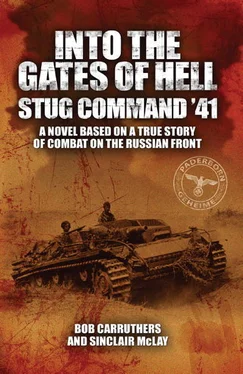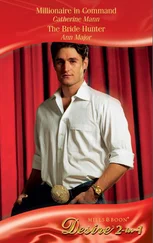* * * * *
Exchanging few words, Wendorff and Sergeant Tarovsky made their way through the tunnels to the building where he had indicated he was going to fish for water. What small talk there was had revealed that the sergeant was from Orel. The sergeant had showed him a picture of his wife and small child by the Oka River. Wendorff had relayed his cover story, that he was brought up in eastern Volhynia on the Soviet side of the border and that his parents were Volksdeutsche , which explained his German accent. Suddenly this cover story had sounded alarmingly precarious.
It was after this that Wendorff started to think about what he would do when they reached the second floor of the building. Despite claiming that he had fished as a young man, the truth was that he had never fished in his life. Would he simply tie the copper wire around the neck of the jar and throw it in the water? He surreptitiously looked at the reel attached to the rod he was carrying, but decided that to attempt to know its workings would make him look foolish.
He then decided that the best way forward would be to offer the rod to the sergeant in a gesture of good faith with some kind words about the fame of Oka fishermen. But then he realized that these thoughts were peripheral and relatively unimportant. What he should really be thinking about was how he was going to be able to kill this sergeant from Orel. Would he do it when the man’s back was turned? Would he use a knife or a rock or his rifle? If he was to knife him, should he cut his throat?
Wendorff felt uneasy thinking these thoughts. No one had told him that war was like this. War wasn’t supposed to be like this. Wars were supposed to be fought at a distance, against a faceless inhuman enemy, not by meeting with your foe, getting to know him, seeing pictures of his wife and child and then, when his back was turned, pulling out a knife and slitting him open.
Wendorff’s misgivings were suddenly interrupted as the sergeant, who had moved a step or two in front of him, raised his hand in a signal that could only mean one thing. At the same time, the sergeant hissed at him. “Quiet. Stop!”
Wendorff stopped immediately. Up ahead, off to their right, voices were coming from behind a door. The sergeant turned around and restated, with a finger to his mouth, the need for silence. He then approached the door slowly, readied his rifle and put his ear to the door and listened. Unexpectedly, he then turned around, grinned broadly at Wendorff, and pushed the door open, announcing in a loud voice, “Comrades!”
Part of Wendorff grimaced. This meant more lying, more deception and a greater chance of being found out. However, another part of him felt relief. His cover had held so far and the nightmare was not to be realized; the nightmare that those voices might have been German and that he would have been forced to fight for his life with men from his own side.
Wendorff stayed in the corridor, presuming that the sergeant would exchange some pleasantries with the men inside and then continue walking. Instead, to Wendorff’s horror, he ushered him into the room. He began to feel claustrophobic. The room was small and chokingly hot. Half a dozen men sat there, obviously completely intoxicated, a crate of vodka in the middle of the room.
He wanted to tug the sergeant’s sleeve and insist that they carry on with their journey to the second floor. That would have been preferable. But what he really wanted to do was walk◦— no, run◦— away from confined spaces, away from Russians, to fresh air… and German voices…
He had no choice, however, and, as he was steered into the room, to his horror, he saw the smiles vanish from the faces of the men inside. Did they know? Had they found out? Was this some kind of trap? Then, to his utter bewilderment, they all burst out laughing. One man, who seemed hopelessly drunk, actually fell over from his sitting position, still pointing at him. Was this some kind of sadistic ritual? Had they known all along and tricked him into entering this small windowless room before killing him?
Then the sergeant, sensing Wendorff’s unease, put his arm around him and said, “Poor man. Thought he was going on a fishing trip and ended up in a war!”
This statement provoked even more hilarity. It was also at this point that Karl Wendorff realized the reason for all this mirth. Here he was, standing in a doorway, in the midst of the greatest military engagement of all time, with a fishing rod in one hand and an empty glass jar in the other. He permitted himself a wry smile before being encouraged to enter the room.
“Sit, comrades! Share a drink with us! It could be your last!”
Despite his craving for liquid of any description, Wendorff’s first thought was to decline. That’s what he usually did. He wasn’t a drinker and his own personal code of conduct dictated that he say no. However, the decision to sit was made for him by the sergeant putting one arm around him and using the other to indicate where he should sit. As soon as the newcomers were seated, the largest of the seated Russian soldiers picked up a full bottle of vodka and offered it to him. His mind froze. What should he do? Russian drinking protocols! What were they? Could he refuse? If not, what was the correct procedure?
He racked his brains. He had been briefed about this very contingency during his training. Slowly it came back…
When you have alcohol in Russia, it must be drunk until it is gone. One should not put a glass with alcohol in it back on the table. Traditionally, alcohol is poured out to all the people present, though they are not required to drink. One should not make a long interruption between the first and second shots. The latecomer must drink a full bottle, called ‘penal’ . Outgoing guests must drink a last glass, called ‘na pososhok’ . It can be translated literally as ‘On a small staff’, meaning ‘an easy or lucky journey’. Every portion of spirit should be accompanied by the touching of glasses and a toast, except for funerals and commemorations, where the touching of glasses is forbidden. It is not allowed to pour out by hand when holding a bottle from below. It is not allowed to fill a glass being held in the air. It is considered bad luck to make a toast with an empty glass. It is considered bad luck to put an empty bottle back on the table when it’s finished.
With these thoughts running through his mind, Karl Wendorff prepared to drink his first full glass. He paused briefly, but his parched and dehydrated body, forgetting the habit of a lifetime, called for him to drink anything. He began to drink the glass offered to him. He had to stop halfway through, as he felt the vile spirit rise up from his gut and try to force itself back out his mouth. By an act of sheer will he managed to swallow it back down without throwing up. He then took a breath and downed the second half of the glass, fighting to keep his face from screwing up too much; trying to give the impression that he was an old hand at this game. The second glass followed quickly and went down a little easier. The sergeant was next, drinking the two glasses in quick succession without the flicker of an eye or even a facial muscle. Wendorff could feel his brain start to heat up.
“So, comrade, it is apparent that you were unlucky today. You did not make a single catch?” asked the burly Russian private, the one who was doing all the talking.
“It is not fish, but water, that he is trying to catch. For the wounded,” said Sergeant Tarovsky, thankfully answering the question for Wendorff.
“This was your idea?” asked the private, looking at Wendorff.
Wendorff nodded, at which point he could feel an almost palpable outpouring of warmth and respect.
“It may be,” said the private, “that in these conditions, water is as valuable as ammunition. One of the nurses described to me the agonies being undergone by patients. There is no water to boil, so not only are infections increasing, but amputations… amputations with a cold knife… this is not something we want to think about. So, thank you, comrade. This is a great service you do.”
Читать дальше












